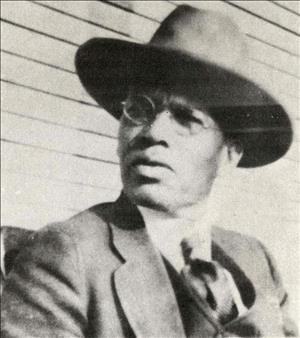Horace Cayton, an ex-slave, came to Seattle in the late 1880s and in a few years was publishing the Seattle Republican, a newspaper directed at both white and black readers and which at one point had the second largest circulation in the city.
Born in 1859 on a Mississippi plantation, he and his family moved to a farm near Port Gibson, Mississippi, after Emancipation. He worked his way through Alcorn College, graduating in the early 1880s.
Convinced that with his education and a will to succeed he could reach his real potential by leaving the South, he headed west, stopping briefly in Kansas, Salt Lake City, and Portland before finally ending up in Seattle, where he began working for the soon-defunct Populist newspaper. Later he worked as a political reporter for the Seattle Post-Intelligencer.
The Seattle Standard, founded in 1892 by Brittain Oxendine, was the city’s first newspaper for black people, and Horace Cayton found employment there until 1893, when it too failed. Seeking to publish a paper that appealed to both black and white people, he issued the first edition of the Seattle Republican on May 19,1894.
By 1896, he had courted and married a young woman he had met in college. Susie Revels Cayton was the daughter of Hiram Revels, the first black person elected to the U.S. Senate. She became associate editor of the paper.
The paper, according to Horace Cayton, "stands for right, and champions the cause of the oppressed. The success of the Republican Party is one of its highest ambitions." And, indeed, it was political, with news of national, state, and local politics in each issue and with his own Republican opinions. Pride in his race was evidenced in reportage of local black success stories and activities in the black community.
The Republican Party, the party of Lincoln, attracted many black people and Horace Cayton was able to win an important position in the party. He was a frequent delegate to the county and state nominating conventions, secretary of the party’s King County convention in 1902, and for several years a member of the Republican State Central Committee.
In Seattle, between 1900 and 1910, the number of blacks had risen from 406 to 2,300, and white prejudice grew. Politically Cayton lost power and, after 1910, he never sat on the Republican State Central Committee or attended a Republican convention.
Horace Cayton became the victim of Seattle’s changing racial and political pattern. In 1917, the Seattle Republican folded three months after Cayton published an article about a Southern lynching. Subscriptions were canceled and advertisements were dropped. He continued to pursue a career in publishing, and issued Cayton’s Weekly from 1916 until 1921, but was unable to make it an economic success.
He lost his beautiful home at 518 14th Avenue North (now East) on Capitol Hill where he and his wife employed a Japanese houseboy and from time to time a Swedish maid, and where Booker T. Washington and other celebrities visited. The family moved to a small house near Mt. Baker Park. In addition, Cayton purchased a three-story wood-framed apartment house on 22nd Avenue near Jackson Street to manage, and Mrs. Cayton found employment as a housekeeper. They entered into activities of the growing black community, participating in social and civic events. He continued his affiliation with the Republican Party through membership in the King County Colored Republican Club.
Horace Cayton died on August 16, 1940, and Susie Revels Cayton died in 1943.

